Videos by Dr Farooq Hasnat
Former Afghanistan Ashraf Ghani visited Pakistan on official visit on August 22, 2019. He held me... more Former Afghanistan Ashraf Ghani visited Pakistan on official visit on August 22, 2019. He held meetings with the Pakistani Prime Minister Imran Khan in Islamabad. Although President Ghani assured Pakistan of his cooperation but his government was crumbling under its own weight of corruption and lack of commitment. The US occupation of Afghanistan had become a huge burden for the credibility of the regime in Kabul. The Taliban were strong and waiting for the right opportunity to strike. IS THE ORGANIZATION OF THE ISLAMIC CONFERENCE (OIC) STILL RELEVANT?
کیا اسلامی کانفرنس کی تنظی... more IS THE ORGANIZATION OF THE ISLAMIC CONFERENCE (OIC) STILL RELEVANT?
کیا اسلامی کانفرنس کی تنظیم اب بھی متعلقہ ہے؟
Dr Farooq Hasnat ڈاکٹر فاروق حسنات
March 22, 2022
Sach TV 1 views
IMPLICATIONS OF NO-CONFIDENCE AGAINST PM IMRAN KHAN
وزیراعظم عمران خان کے خلاف عدم اعتماد کی ت... more IMPLICATIONS OF NO-CONFIDENCE AGAINST PM IMRAN KHAN
وزیراعظم عمران خان کے خلاف عدم اعتماد کی تحریک اور اس کے مضمرات
DR FAROOQ HASNAT & DR ZAMURRAD AWAN
ANALYSIS FROM PAKISTAN
March 28, 2022 1 views
MIDDLE EAST REVIEW IN YEAR 2020
سال ۲۰۲۰ میں مشرق وسطی کا ایک جائزہ
DR FAROOQ HASNATڈاکٹر فارو... more MIDDLE EAST REVIEW IN YEAR 2020
سال ۲۰۲۰ میں مشرق وسطی کا ایک جائزہ
DR FAROOQ HASNATڈاکٹر فاروق حسنات
DECEMBER 23, 2020
Voice of America AFGHANISTAN AND OIC FOREIGN MINISTERS SUMMIT
افغانستان اور او آئی سی کے وزرائے خارجہ کا اجلاس
D... more AFGHANISTAN AND OIC FOREIGN MINISTERS SUMMIT
افغانستان اور او آئی سی کے وزرائے خارجہ کا اجلاس
DR FAROOQ HASNAT۔ ڈاکٹر فاروق حسنات۔
SAACH TV
DECEMBER 20, 2021 FORCED DEMOGRAPHIC CHANGES IN INDIAN OCCUPIED KASHMIR
بھارتی زیر قبضہ کشمیر کی آبادی میں جبری ... more FORCED DEMOGRAPHIC CHANGES IN INDIAN OCCUPIED KASHMIR
بھارتی زیر قبضہ کشمیر کی آبادی میں جبری تبدیلیاں
Dr Farooq Hasnat ڈاکٹر فاروق حسنات
June 29, 2020
Radio Pakistan 1 views
President Biden, while addressing at the State Department, on February 4th presented a sketch of ... more President Biden, while addressing at the State Department, on February 4th presented a sketch of his Foreign Policy, which was promised to be different from that of former President Trump, in style and content. He laid the foundations of his future plans by highlighting; “— we must start with diplomacy rooted in America’s most cherished democratic values: defending freedom, championing opportunity, upholding universal rights, respecting the rule of law, and treating every person with dignity”. This is exactly the opposite of what Trump believed.
The President repeatedly stressed that his objective will be to take along the world, especially the allies when dealing with various important issues and conflicts. He further said that diplomacy would be the cornerstone of his Foreign Policy and not brinkmanship. He said that even with the opponents, his administration would utilize diplomatic measures to resolve the differences and conflicts. He further promised to adopt a more humane polic 2 views
US THREAT TO PAKISTAN ON NUCLEAR PROGRAMME
جوھری پروگرام پر امریکہ کی پاکستان کو دھمکی
Dr F... more US THREAT TO PAKISTAN ON NUCLEAR PROGRAMME
جوھری پروگرام پر امریکہ کی پاکستان کو دھمکی
Dr Farooq Hasnat ڈاکٹر فاروق حسنات
October 17, 2022
Saach TVhttps://www.youtube.com/watch?v=etiHl4rdAoc
In recent months Pakistan witnessed a spike in terror activities in the Province of Khyber Pakh... more In recent months Pakistan witnessed a spike in terror activities in the Province of Khyber Pakhtunkhwa, bordering Afghanistan. It is regarded as a failure of Pakistan's current "imported" government, which came through international conspiracy and financial malpractices by the mafias - through bribing members of the National Assembly. The current government is busy changing laws so that corruption cases against them can be removed. Therefore, they paid no attention to the more pressing problems Pakistan faced, including a spike in terror activities.
https://www.youtube.com/watch?v=L1REubfvU1g 1 views
Prime Minister Imran Khan on Wednesday appreciated Turkish President Recep Tayyip Erdogan for "on... more Prime Minister Imran Khan on Wednesday appreciated Turkish President Recep Tayyip Erdogan for "once again raising his voice in support of the rights of the Kashmiri people" during his address to the United Nations General Assembly (UNGA).
"Turkey’s unwavering support remains a source of strength for the Kashmiris in their legitimate struggle for self-determination,"
said the premier.
(February 12, 2020- TV 7) Papers by Dr Farooq Hasnat

Justice and Ethics in the Contemporary World ICJECA (Iran), 2017
In its unique form, Jirga (informal judicial setup) is practiced in the northern tribal areas of ... more In its unique form, Jirga (informal judicial setup) is practiced in the northern tribal areas of Pakistan bordering Afghanistan, known as Fata. It comprises elders from various local tribes, coordinated by leading personalities known as Maliks. In the past, the Pakistani federal government granted autonomy to the region. The majority of the tribes are Sunni Muslims, while Shia tribes also exist in a sizable minority. The construction of the tribal society adheres to a mixture of cultural and religious norms, sometimes making it difficult to separate the two. Following the emergence of the Taliban, the centuries-old Jirga system lost its construction and effectiveness under the rigid rule of the Taliban. With the start of the military operations in the last decade against the Taliban leading to its decline and possible overthrow, a vacuum has been created, which has become the foundation of a debate in Pakistan regarding the future set-up in these tribal areas.
In this situation, we believe the current environment of rebuilding created after the evacuation
of the Taliban from this area provides a constructive setting for the new system, which should be influenced by the teachings and examples of the family of the Holy Prophet (PBUH)—Ahl Al-Bayt. Through this restructuring of the Jirga system, many deficiencies within the cultural traits of the tribal system can also be addressed, and the foundation of a healthy society on the principles of justice, equality, and fair play can be established.
Independent, 2002
India believes that with a suitable standoff, it will be able to browbeat Pakistan into accepting... more India believes that with a suitable standoff, it will be able to browbeat Pakistan into accepting its supremacy in the region, even without fighting a war.
DEPARTMENT OF PEACE AND CONFLICT STUDIES NATIONAL DEFENCE UNIVERSITY, ISLAMABAD, 2015
The political crisis in Pakistani society, a complex issue with deep-rooted causes, has profoundl... more The political crisis in Pakistani society, a complex issue with deep-rooted causes, has profoundly impacted various aspects of the nation. From the abysmally low literacy rate to the mismanagement of affairs by the ruling elite, these factors have hindered our society's normal course of development. The pursuit of wealth and power has further complicated matters, affecting growth in all fields of national activity – political, economic, cultural, linguistic identity, and social values.
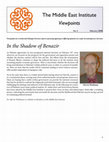
Middle East Institute - Washington, D.C., 2002
As Pakistan approaches its once-postponed national elections on February 18th, most observers are... more As Pakistan approaches its once-postponed national elections on February 18th, most observers are focused on the prospects for the government and opposition parties and whether the election contest will be free and fair. The fallout from the assassination of Benazir Bhutto continues to shape the political discourse as to the tensions from mounting popular economic grievances. There is uncertainty whether the elections will bring normalization to Pakistan’s volatile political scene or usher in a period of instability. There are fears that the results will be contested, leading to street violence and possibly another imposition of emergency rule.
Yet, at the same time, there is a widely shared belief among observers that the country is in a transitional phase, moving from authoritarianism towards greater democracy. Many are hoping that a stable civilian government can provide the national consensus that may be needed to confront the religiously motivated extremists who are increasingly challenging the ideology and authority of the Pakistani state. In the following two essays, two of Pakistan’s most astute political analyst, H. ASKARI Rizvi and SYED FAROOQ HASNAT, have been asked by the Middle East Institute to present their views on these and related topics. Both offer a troubling picture, indicating the uncertainty that surrounds the elections and the likelihood that Pakistan may be facing a period of continuing political turmoil.
Marvin Weinbaum
Director
Middle East Institute - Washington D.C., 2008
The newly elected government of Pakistan has clearly stated that it will review its domestic and ... more The newly elected government of Pakistan has clearly stated that it will review its domestic and foreign policies. Prime Minister Syed Yousaf Raza Gilani, in an article published in the Washington Post on April 30, 2008 wrote "Like newly elected governments in other democratic societies, we intend to set the tone and agenda. We want to show the world that our nation is back in business, with an overwhelming mandate from our people." The new government presents increased economic opportunities, and new avenues for many foreign investors. But as the title of the article suggests ("We will fight terrorism-Our Way"), Pakistan will also alter its security agenda. The new government's key focus, unlike that of General Musharraf, will be on the countries of the Gulf.
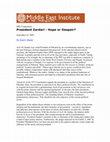
Middle East Institute, Washington, DC; MEI Commentary, 2008
Asif Ali Zardari was voted President of Pakistan by an overwhelming majority, just as the post Fe... more Asif Ali Zardari was voted President of Pakistan by an overwhelming majority, just as the post February election alignment had projected. In the national and provisional elections, the Pakistan Peoples Party ( PPP) emerged as the single largest party in the National Assembly and did well in all of the four provinces, especially in Sindh. Taking advantage of its strength, the co-chairman of the PPP was able to maneuver a majority in Baluchistan and a coalition in the North-West Frontier Province and Punjab. At present, with the exception of Punjab, it is a partner in the government in all the political arrangements of Pakistan. Many analysts give credit for this success to Zardari, citing his political “ wisdom and skills”, Others agree that his rise to power would not have been possible without compromises made with Musharraf and other actors of the establishment. Whatever the reality, Zardari is in charge of the political landscape of Pakistan, with enormous powers provided by a distorted constitution from the rule of General Musharraf.
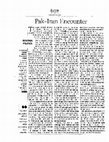
The Nation, 2024
The recent military encounter between Pakistan and Iran exemplifies two distinct scenarios. First... more The recent military encounter between Pakistan and Iran exemplifies two distinct scenarios. Firstly, it highlights the vulnerability to conflict escalation when a minor terrorist incident/s creates a situation where two sizable and well-equipped nations, ordinarily on friendly terms, find themselves on the brink of a potentially hazardous confrontation or even a localized war. Secondly, it underscores the potential for de-escalation and a return to amicable relations if a foundation of goodwill exists and the engaging actors share a longstanding history of positive interactions. In such cases, hostilities can swiftly recede, and a commitment to diligently address any identified loopholes in the future can pave the way for a return to normalcy.
Both nations should be vigilant against becoming pawns in the hands of external interests, acknowledging that their cultural, traditional, linguistic, and literary affinities form a unique bond beyond shared security concerns. Emphasizing the significance of unity, collective progress becomes achievable, while division may result in mutual decline. The strategic benefits and shared friendly history underscore the imperative for Iran and Pakistan to prioritize collaboration over discord, ensuring the prosperity of both nations. Addressing the challenge of Baloch-related terrorism should be a joint effort, recognizing its commonality and the need for a collective approach.
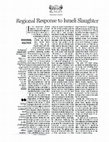
The Nation, 2023
In the tumultuous Middle Eastern landscape, October 2023 witnessed a tragic escalation of hostili... more In the tumultuous Middle Eastern landscape, October 2023 witnessed a tragic escalation of hostilities between Israel and Hamas, resulting in a devastating toll on human lives. So far, the conflict has claimed over 13,500 Palestinian lives, including at least 5,600 children and 3,600 women, with an additional 30,000 individuals sustaining injuries, 75 percent of whom were women and children. The hospitals and schools were bombed nonstop, caring less for the sick and injured. The Israeli war machine is ordering the helpless Palestinians to move around the enclave of Gaza as if they are not humans but a herd of cattle. These scenes remind us of the holocaust of the 1930s when the Nazi Germany ordered Jews to evacuate to Poland and other places. Dubbed the "Graveyard of Children" by some media outlets, this conflict, characterized as a "war" by biased Western media, lacks the typical conditions of parity, rendering Palestinians vulnerable to the Israeli military. It can be aptly described as either a genocide or a massacre of Palestinians.
THE NATION, 2021
President Biden, while addressing the State Department, on February 4 presented a sketch of his f... more President Biden, while addressing the State Department, on February 4 presented a sketch of his foreign policy, which was promised to be different from that of former President Trump, in style and content. He laid the foundations of his future plans by highlighting, “..we must start with diplomacy rooted in America’s most cherished democratic values: defending freedom, championing opportunity, upholding universal rights, respecting the rule of law, and treating every person with dignity”. This is exactly the opposite of what Trump believed.
THE NATION, 2021
President Biden, while addressing the State Department, on February 4 presented a sketch of his f... more President Biden, while addressing the State Department, on February 4 presented a sketch of his foreign policy, which was promised to be different from that of former President Trump, in style and content. He laid the foundations of his future plans by highlighting, “..we must start with diplomacy rooted in America’s most cherished democratic values: defending freedom, championing opportunity, upholding universal rights, respecting the rule of law, and treating every person with dignity”. This is exactly the opposite of what Trump believed.

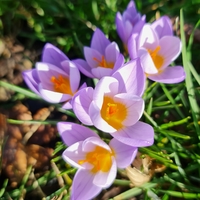







Uploads
Videos by Dr Farooq Hasnat
کیا اسلامی کانفرنس کی تنظیم اب بھی متعلقہ ہے؟
Dr Farooq Hasnat ڈاکٹر فاروق حسنات
March 22, 2022
Sach TV
وزیراعظم عمران خان کے خلاف عدم اعتماد کی تحریک اور اس کے مضمرات
DR FAROOQ HASNAT & DR ZAMURRAD AWAN
ANALYSIS FROM PAKISTAN
March 28, 2022
سال ۲۰۲۰ میں مشرق وسطی کا ایک جائزہ
DR FAROOQ HASNATڈاکٹر فاروق حسنات
DECEMBER 23, 2020
Voice of America
افغانستان اور او آئی سی کے وزرائے خارجہ کا اجلاس
DR FAROOQ HASNAT۔ ڈاکٹر فاروق حسنات۔
SAACH TV
DECEMBER 20, 2021
بھارتی زیر قبضہ کشمیر کی آبادی میں جبری تبدیلیاں
Dr Farooq Hasnat ڈاکٹر فاروق حسنات
June 29, 2020
Radio Pakistan
The President repeatedly stressed that his objective will be to take along the world, especially the allies when dealing with various important issues and conflicts. He further said that diplomacy would be the cornerstone of his Foreign Policy and not brinkmanship. He said that even with the opponents, his administration would utilize diplomatic measures to resolve the differences and conflicts. He further promised to adopt a more humane polic
جوھری پروگرام پر امریکہ کی پاکستان کو دھمکی
Dr Farooq Hasnat ڈاکٹر فاروق حسنات
October 17, 2022
Saach TVhttps://www.youtube.com/watch?v=etiHl4rdAoc
https://www.youtube.com/watch?v=L1REubfvU1g
"Turkey’s unwavering support remains a source of strength for the Kashmiris in their legitimate struggle for self-determination,"
said the premier.
(February 12, 2020- TV 7)
Papers by Dr Farooq Hasnat
In this situation, we believe the current environment of rebuilding created after the evacuation
of the Taliban from this area provides a constructive setting for the new system, which should be influenced by the teachings and examples of the family of the Holy Prophet (PBUH)—Ahl Al-Bayt. Through this restructuring of the Jirga system, many deficiencies within the cultural traits of the tribal system can also be addressed, and the foundation of a healthy society on the principles of justice, equality, and fair play can be established.
Yet, at the same time, there is a widely shared belief among observers that the country is in a transitional phase, moving from authoritarianism towards greater democracy. Many are hoping that a stable civilian government can provide the national consensus that may be needed to confront the religiously motivated extremists who are increasingly challenging the ideology and authority of the Pakistani state. In the following two essays, two of Pakistan’s most astute political analyst, H. ASKARI Rizvi and SYED FAROOQ HASNAT, have been asked by the Middle East Institute to present their views on these and related topics. Both offer a troubling picture, indicating the uncertainty that surrounds the elections and the likelihood that Pakistan may be facing a period of continuing political turmoil.
Marvin Weinbaum
Director
Both nations should be vigilant against becoming pawns in the hands of external interests, acknowledging that their cultural, traditional, linguistic, and literary affinities form a unique bond beyond shared security concerns. Emphasizing the significance of unity, collective progress becomes achievable, while division may result in mutual decline. The strategic benefits and shared friendly history underscore the imperative for Iran and Pakistan to prioritize collaboration over discord, ensuring the prosperity of both nations. Addressing the challenge of Baloch-related terrorism should be a joint effort, recognizing its commonality and the need for a collective approach.
کیا اسلامی کانفرنس کی تنظیم اب بھی متعلقہ ہے؟
Dr Farooq Hasnat ڈاکٹر فاروق حسنات
March 22, 2022
Sach TV
وزیراعظم عمران خان کے خلاف عدم اعتماد کی تحریک اور اس کے مضمرات
DR FAROOQ HASNAT & DR ZAMURRAD AWAN
ANALYSIS FROM PAKISTAN
March 28, 2022
سال ۲۰۲۰ میں مشرق وسطی کا ایک جائزہ
DR FAROOQ HASNATڈاکٹر فاروق حسنات
DECEMBER 23, 2020
Voice of America
افغانستان اور او آئی سی کے وزرائے خارجہ کا اجلاس
DR FAROOQ HASNAT۔ ڈاکٹر فاروق حسنات۔
SAACH TV
DECEMBER 20, 2021
بھارتی زیر قبضہ کشمیر کی آبادی میں جبری تبدیلیاں
Dr Farooq Hasnat ڈاکٹر فاروق حسنات
June 29, 2020
Radio Pakistan
The President repeatedly stressed that his objective will be to take along the world, especially the allies when dealing with various important issues and conflicts. He further said that diplomacy would be the cornerstone of his Foreign Policy and not brinkmanship. He said that even with the opponents, his administration would utilize diplomatic measures to resolve the differences and conflicts. He further promised to adopt a more humane polic
جوھری پروگرام پر امریکہ کی پاکستان کو دھمکی
Dr Farooq Hasnat ڈاکٹر فاروق حسنات
October 17, 2022
Saach TVhttps://www.youtube.com/watch?v=etiHl4rdAoc
https://www.youtube.com/watch?v=L1REubfvU1g
"Turkey’s unwavering support remains a source of strength for the Kashmiris in their legitimate struggle for self-determination,"
said the premier.
(February 12, 2020- TV 7)
In this situation, we believe the current environment of rebuilding created after the evacuation
of the Taliban from this area provides a constructive setting for the new system, which should be influenced by the teachings and examples of the family of the Holy Prophet (PBUH)—Ahl Al-Bayt. Through this restructuring of the Jirga system, many deficiencies within the cultural traits of the tribal system can also be addressed, and the foundation of a healthy society on the principles of justice, equality, and fair play can be established.
Yet, at the same time, there is a widely shared belief among observers that the country is in a transitional phase, moving from authoritarianism towards greater democracy. Many are hoping that a stable civilian government can provide the national consensus that may be needed to confront the religiously motivated extremists who are increasingly challenging the ideology and authority of the Pakistani state. In the following two essays, two of Pakistan’s most astute political analyst, H. ASKARI Rizvi and SYED FAROOQ HASNAT, have been asked by the Middle East Institute to present their views on these and related topics. Both offer a troubling picture, indicating the uncertainty that surrounds the elections and the likelihood that Pakistan may be facing a period of continuing political turmoil.
Marvin Weinbaum
Director
Both nations should be vigilant against becoming pawns in the hands of external interests, acknowledging that their cultural, traditional, linguistic, and literary affinities form a unique bond beyond shared security concerns. Emphasizing the significance of unity, collective progress becomes achievable, while division may result in mutual decline. The strategic benefits and shared friendly history underscore the imperative for Iran and Pakistan to prioritize collaboration over discord, ensuring the prosperity of both nations. Addressing the challenge of Baloch-related terrorism should be a joint effort, recognizing its commonality and the need for a collective approach.
The latest brutal-onslaught started on 8th July 2014, lasting for 50 days of unabated airstrikes, naval bombardment: and artillery fire by the Israeli Defence Forces, under the name ‘Protective Edge' - targeted scores of innocent Palestinians including ‘women, children and disabled people mercilessly; without any distinction of civilians and combats. The most effected were the babies and small children: The causality list pronounced more than 2,100 Palestinians dead, including 500 children; while 11,000 were seriously wounded.
In the year 2020, the failed blockade of Qatar by Saudi Arabia and the United Arab Emirates Bahrain, and Egypt continued. By the end of the year, there were indications that at the platform of the Gulf Cooperation Organization (GCC) Saudi Arabia and the UAE would refrain from this illegal move against Qatar. However, in the first week of 2021, 43-month air, land, and sea blockade was lifted, although many issues, which became the cause of this conflict continue. In other words, Qatar refused to give way to 13 “non-negotiable” lists of demands of June 2017. Qatar was able to sustain such comprehensive punishments by Gulf monarchies by counterbalance - promoting economic and strategic linkages with Iran and more so with Turkey. Turkey, as a follow up of an agreement signed in 2014, in the aftermath of Arab Spring upheavals, established a military camp, in Qatar, with a capacity of 5,000 troops. On the economic front, the two countries had signed a total of 52 agreements and five joint declarations.
Although new alliances started to take shape in the Middle East, it is yet to be appraised of the strategy the newly elected Biden administration would adopt towards the Middle East region. It is expected from the new US president that he would detach himself from Trump’s extremist rhetoric and revisit the nuclear deal with Iran, while Saudi Arabia and the UAE are in limbo, struggling to realign their national interests in the unforeseeable Middle East.
historic similarities and interdependence. It was realized that for its strategic needs Pakistan could trust these two vital non-Arab Muslim nations of the Middle East. It is no coincidence that Quaid’s close companion Raja Ghazanfar Ali Khan was carefully chosen and appointed as Pakistan’s first Ambassador to Iran (1948-1952) and subsequently to Turkey (1952-1953). His assignment was to lay a solid foundation of close ties with these two natural allies of Pakistan.
عمران خان کے ساتھ عدالتی ناانصافی
Dr Farooq Hasnatڈاکٹر فاروق حسنات۔
February 01, 2024
افغان مہاجرین کی واپسی۔ کیا کاکڑ کی غیر آئینی حکومت ایسا کر سکتی ہے؟
Guest:- Dr Fraooq Hasnat
Host:- Dr Zamurrad Awan
November 11, 2023
. غزہ بحران - ایک جامع تجزیہ
DR FAROOQ HASNAT. ڈاکٹر فاروق حسنات
OCT, 2023
SAACH TV – SPECIAL PROGRAMME
In an interview with IRNA Dr. Syed Farooq Hasnat, a well-known professor of international relations and political science at Pakistani universities, currently based in Colombia, Maryland called Donald Trump, the 45th President of the United States, anti-Muslim, bigoted and racist.
It was against this background that we planned our project, fully aware of the resources and time constraints. We were fortunate to bring together writers from Pakistan's provinces in this volume. We hope that the book will provide a better understanding of the burdens and problems that are faced by 16 million Pakistanis every day in their life.
In the introduction, we provide an overall assessment of Pakistan's situation on the eve of the 2007 national and provincial elections. The society is divided between those who would like to see the establishment of a civil society and the others who accept the presence of an active service army officer (along with his corps commanders and their junior officers) as a necessary instrument for their political survival. Establishing and empowering civil society remains the principal issue in present-day Pakistan. The success or failure of democratic traditions would also determine the viability of the Pakistani state as a sovereign and influential member of the international community.
In part one of the book, a wide range of domestic issues are analyzed, ranging from forming local political institutions to matters of economy and poverty. This part also discusses women’s rights, provides a case study of various aspects and phases of Musharraf’s government, and reviews the country's defense capability. Academicians from the four provinces present their viewpoints on provincial politics.
Part two deals with matters of foreign concern. Some articles are taking up subjects of immediate concern for Pakistan, like the Kashmir dispute and Pakistan’s precarious relations with Afghanistan. This part also addresses the critical aspect of Pakistan’s relations with India. Writers also deal with how Pakistan is coping with the global war on terror and analyze the dynamics of water sharing that have emerged anew on the horizon.
This book is not a chronological narration of events in Pakistan’s history, even though there is much discussion of history in the book. It should be viewed as an in-depth articulation of problems that have impeded the development of civil society in Pakistan. We hope the issues analyzed in this book will inform Pakistan’s policymakers, both in and outside of government, as they debate the nation’s agenda during the coming general elections.
The 1979 Islamic Revolution in Iran marked a significant turning point in the region's history. It surpassed the expectations and theories put forth by Western scholars, surprising both those physically and emotionally connected to the country. As neighbors, we were thrilled to witness the emergence of an independent Iran with progressive foreign and domestic policies. The newly established Islamic Republic of Iran successfully established democratic institutions that permeated all aspects of social and political interactions. This book aims to analyze the root causes of the conflict between Iran and Iraq through a comprehensive theoretical framework
Pakistan's relationship with the Persian Gulf Region cannot be disregarded, given its proximity and security concerns. In particular, the well-being and strength of Iran directly align with Pakistan's vital interests.
Apart from a brief history of the Sikh nation, we have tried to give a detailed analysis of their current problems, which have pitched them into a confrontation with the government of India. We have also tried to look into the future and have attempted to foretell what is probably in store for this minority community. We have emphasized analyzing agitational politics in East Punjab over the last few years.
We have gone into greater detail about the essential conflict issues in Punjab, like the river-waters dispute, the Chandigarh question, power dispute, and religious-constitutional demands.
We have given an extensive chronology to document almost all the critical events and developments of Sikh history. We sincerely hope this attempt will help us understand the history of the Sikhs.
In our project, there were handicaps, and the free flow of information sometimes became scarce. Therefore, we could not visit India and had to rely heavily on whatever was available in libraries in Lahore, Rawalpindi, and Islamabad, especially the Institute of Regional Studies and the news media.
Sikhism is not an ordinary religion. Historically, it took birth almost in the same period that saw the emergence of Christian Protestantism. Baba Guru Nanak (1469-1538), father of Sikh religion, and Martin Luther (1483-1546), father of Lutheranism and Protestantism, were both contemporaries. Just as Martin Luther protested against the oppressive intolerance and elaborate ritualism of Roman Catholicism, Baba Guru Nanak protested against the social stratification and multi-idolatrous ritualism of Hinduism.
However, the analogy between Sikhism and Protestantism ends here. Unlike Protestantism, Sikhism developed its own Bible called Guru Granth Sahib, its simple ritualism, and its own identity regarding religious shrines, food, and the bodily appearance of its adherents. Further, it discarded Hindu dogmas, preached against idolatry and caste distinctions, and laid stress on the Unity of God. Thus, it would be a mistake to consider Sikhs as Hindus just as the followers of Christ cannot be regarded as Jews, although Christ by birth was a Jew.
There are many reasons behind these failures and disillusionment. As a result of four military dictatorships in the country, the democratic process was derailed and institutions weakened. Even in the decade of democracy, (1988 to 1999) hardly any elected government was given a chance to complete its full tenure. The extended delays in the making of the Constitution for the new state were yet another reason for the failure of the construction of any viable institutions, nor were any solid traditions established for managing the country.
The Afghan war in the 1980s multiplied Pakistan’s problems. It was during this period that the culture of militancy and bigotry was inculcated in the society by the military government of General Zia-ul-Haq. This played havoc with the social fabric of the country, badly disturbing its equilibrium. It also undermined Pakistan’s global image because the international community started viewing the country as a hub and even a sponsor of terror groups. Pakistan’s drift towards religious extremism and militancy have serious implications for the region, with global connotations. The most alarming aspect of this phenomenon remains in religious extremism, where sectarian intolerance and hatred was allowed to grow unchecked. This promoted killings, blasts, armed attacks and suicide bombings, in which thousands of Pakistanis have lost their lives.